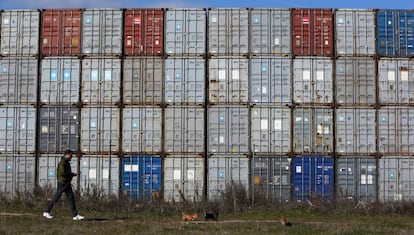Rising oil prices threaten Spain’s economic growth model
Jump caused by spike in oil prices raises concerns about Spain’s ability to stay competitive
For more than three years, Spain’s inflation rate has been below the euro-zone average and even lower than that of Germany, the bloc’s most competitive country. Over this period, the Spanish government has consistently pushed the line that employment creation in the country has been the result of this low inflation rate, and while it may be a coincidence, Spain started to create jobs just two months after inflation in the country fell below the euro-zone average.

This reading of the Spanish economy has it that internal devaluation in Spain allowed the economy to become more competitive within the euro-zone and to boost exports – a cornerstone of the country’s recovery.
But after 39 months of gains in competitiveness, Spain’s inflation rate in December jumped to 1.4% year on year in harmonized terms on the back of higher oil prices. That’s against a 1.1% rise in the euro zone as a whole, sounding the alarm among economists. To make matters worse, the trend is expected to continue for several months triggered by rising crude prices.
Rising inflation could affect competitiveness if it ends up creating pressure to raise wages or boost margins María Jesús Fernández, Funcas
“The Spanish economy is very dependent on oil, which it uses intensively,” says José Domingo Roselló, an analyst with the Flores de Lemus Institute at the Charles III University of Madrid. “The CPI fell more when oil prices dropped and now that crude prices are rising, the CPI has climbed. This begs the question as to whether more competition is needed to bring down prices in energy-production sectors.”
Experts say December’s spike in inflation won’t necessarily have an impact on competitiveness, but warn there are associated risks.
“The CPI is not the goods that we export. There are goods in this basket that are not exported. But it’s true [the rise in CPI could have an effect] if it ends up creating pressure to raise wages or boost margins. It is an indirect indicator of competitiveness,” says María Jesús Fernández, an economist with the Spanish think-tank Funcas.
This is what concerns economists: so-called “second-round effects.” While higher oil prices might have a transitory statistical impact on CPI, year-on-year inflation is forecast to go as high as 3% in the first quarter of 2017, putting intense pressure on wages and margins and placing exports at risk.
It doesn’t make sense to give in to the temptation to compensate for rising oil prices with higher salaries Rafael Domenech, BBVA
This could put an end to the moderation that, in the last three years, has allowed Spain to be one of the few Western countries, along with Germany, to boost exports.
According to data from the EU statistics body Eurostat and Spain’s national statistics institute, the INE, Spain, by September 2016, had managed to recover all the competitiveness it has lost against Germany since the Euro was introduced.
But while Germany has retained its competitiveness through dampening demands for salary increases by reining in inflation and getting as many people into the workforce as possible, Spain has done so by drastically slimming its workforce and producing more and more with fewer and fewer workers.
Spain only resorted to reining in wages as the crisis became entrenched, explains Josep Oliver, an economics professor at the Autonomous University of Barcelona. But rising inflation could put the strategy at risk.
“The rise in oil prices means transferring costs from importing countries to producers. We have to accept that we are poorer. It doesn’t make sense to give in to the temptation to compensate for rising oil prices with higher salaries,” says Rafael Domenech, an economist with BBVA bank.
Others stress the need to make Europe the benchmark. “It is not possible to raise wages more than elsewhere in the euro-zone. This has to be the limit if we don’t want to go backwards,” a highly placed source in the government said.
English version by George Mills.
Tu suscripción se está usando en otro dispositivo
¿Quieres añadir otro usuario a tu suscripción?
Si continúas leyendo en este dispositivo, no se podrá leer en el otro.
FlechaTu suscripción se está usando en otro dispositivo y solo puedes acceder a EL PAÍS desde un dispositivo a la vez.
Si quieres compartir tu cuenta, cambia tu suscripción a la modalidad Premium, así podrás añadir otro usuario. Cada uno accederá con su propia cuenta de email, lo que os permitirá personalizar vuestra experiencia en EL PAÍS.
¿Tienes una suscripción de empresa? Accede aquí para contratar más cuentas.
En el caso de no saber quién está usando tu cuenta, te recomendamos cambiar tu contraseña aquí.
Si decides continuar compartiendo tu cuenta, este mensaje se mostrará en tu dispositivo y en el de la otra persona que está usando tu cuenta de forma indefinida, afectando a tu experiencia de lectura. Puedes consultar aquí los términos y condiciones de la suscripción digital.









































